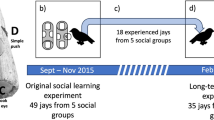Abstract
Animals may memorise spatial and social information for many months and even years. Here, we investigated long-term memory of hierarchically ordered relationships, where the position of a reward depended on the relationship of a stimulus relative to other stimuli in the hierarchy. Seventeen greylag geese (Anser anser) had been trained on discriminations between successive pairs of five or seven implicitly ordered colours, where the higher ranking colour in each pair was rewarded. Geese were re-tested on the task 2, 6 and 12 months after learning the dyadic colour relationships. They chose the correct colour above chance at all three points in time, whereby performance was better in colour pairs at the beginning or end of the colour series. Nonetheless, they also performed above chance on internal colour pairs, which is indicative of long-term memory for quantitative differences in associative strength and/or for relational information. There were no indications for a decline in performance over time, indicating that geese may remember dyadic relationships for at least 6 months and probably well over 1 year. Furthermore, performance in the memory task was unrelated to the individuals’ sex and their performance while initially learning the dyadic colour relationships. We discuss possible functions of this long-term memory in the social domain.

Similar content being viewed by others
References
Balda RP, Kamil AC (1992) Long-term spatial memory in Clark’s nutcracker, Nucifraga columbiana. Anim Behav 44:761–769
Boeckle M, Bugnyar T (2012) Long-term memory for affiliates in ravens. Curr Biol 22(9):801–806. doi:10.1016/j.cub.2012.03.023
Bogale BA, Sugawara S, Sakano K, Tsuda S, Sugita S (2012) Long-term memory of color stimuli in the jungle crow (Corvus macrorhynchos). Anim Cog 15(2):285–291. doi:10.1007/s10071-011-0439-9
Bond AB, Kamil AC, Balda RP (2003) Social complexity and transitive inference in corvids. Anim Behav 65(3):479–487. doi:10.1006/anbe.2003.2101
Bond AB, Wei CA, Kamil AC (2010) Cognitive representation in transitive inference: a comparison of four corvid species. Behav Proc 85:283–292. doi:10.1016/j.beproc.2010.08.003
Fagot J, Cook RG (2006) Evidence for large long-term memory capacities in baboons and pigeons and its implications for learning and the evolution of cognition. Proc Natl Acad Sci 103(46):17564–17567
Frigerio D, Weiss B, Kotrschal K (2001) Spatial proximity among adult siblings in greylag geese (Anser anser): evidence for female bonding? Acta Ethol 3:121–125
Galwey NW (2006) Introduction to mixed modelling. Wiley, Chichester, UK
Ganter B, Cooke F (1998) Colonial nesters in a deteriorating habitat: site fidelity and colony dynamics of lesser snow geese. Auk 115(3):642–652
Grosenick L, Clement TS, Fernald RD (2007) Fish can infer social rank by observation alone. Nature 445(7126):429–432. doi:10.1038/nature05511
Hemetsberger J, Scheiber IBR, Weiß BM, Frigerio D, Kotrschal K (2010) Influence of socially involved hand-raising on life history and stress responses in greylag geese. Interact Stud 11(3):380–395
Hestbeck JB, Nichols JD, Malecki RA (1991) Estimates of movement and site fidelity using mark-resight data of wintering Canada geese. Ecology 72(2):523–533
Jacobs LF (2006) From movement to transitivity: the role of hippocampal parallel maps in configural learning. Rev Neurosci 17:99–109
Karpicke JD (2012) Retrieval-based learning: active retrieval promotes meaningful learning. Curr Dir Psychol Sci 21(3):157–163. doi:10.1177/0963721412443552
Kendrick KM, da Costa AP, Leigh AE, Hinton MR, Peirce JW (2001) Sheep don’t forget a face. Nature 414:165–166. doi:10.1038/35102669
Kotrschal K, Scheiber IBR, Hirschenhauser K (2010) Individual performance in complex social systems: the greylag goose example. In: Kappeler P (ed) Animal behavior: evolution and mechanisms. Springer Verlag, Heidelberg, pp 121–148
MacLean E, Merritt D, Brannon E (2008) Social complexity predicts transitive reasoning in prosimian primates. Anim Behav 76(2):479–486. doi:10.1016/j.anbehav.2008.01.025
Mettke-Hofmann C, Gwinner E (2003) Long-term memory for a life on the move. Proc Natl Acad Sci 100(10):5863–5866. doi:10.1073/pnas.1037505100
Murai C, Tanaka M, Tomonaga M, Sakagami M (2011) Long-term visual recognition of familiar persons, peers, and places by young monkeys (Macaca fuscata). Dev Psychobiol 53(7):732–737. doi:10.1002/dev.20548
Paz-y-Miño G, Bond AB, Kamil AC, Balda RP (2004) Pinyon jays use transitive inference to predict social dominance. Nature 430:778–781
Roth TC, LaDage LD, Pravosudov VV (2012) Evidence for long-term spatial memory in a parid. Anim Cog 15(2):149–154. doi:10.1007/s10071-011-0440-3
Scheiber IBR, Weiß BM, Frigerio D, Kotrschal K (2005) Active and passive social support in families of greylag geese (Anser anser). Behaviour 142:1535–1557
Scheiber IBR, Kotrschal K, Weiß BM (2009) Benefits of family reunions: social support in secondary greylag goose families. Horm Behav 55:133–138
Shettleworth SJ (2010) Cognition, evolution, and behaviour, 2nd edn. Oxford University Press, New York
Smulders TV, Gould KL, Leaver LA (2010) Using ecology to guide the study of cognitive and neural mechanisms of different aspects of spatial memory in food-hoarding animals. Phil Trans R Soc B 365:883–900. doi:10.1098/rstb.2009.0211
von Fersen L, Wynne CDL, Delius JD (1991) Transitive inference formation in pigeons. J Exp Psychol 17(3):334–341
Weiß BM, Kehmeier S, Schloegl C (2010) Transitive inference in free-living greylag geese, Anser anser. Anim Behav 79:1277–1283. doi:10.1016/j.anbehav.2010.02.029
Weiß BM, Kotrschal K, Foerster K (2011) A longitudinal study of dominance and aggression in greylag geese (Anser anser). Behav Ecol 22(3):616–624. doi:10.1093/beheco/arr020
Wilson HJ, Norriss DW, Walsh A, Fox AD, Stroud DA (1991) Winter site fidelity in Greenland white-fronted geese Anser albifrons flavirostris, implications for conservation and management. Ardea 79:287–294
Acknowledgments
We thank K. Kotrschal and C. Schloegl for permanent support, and the associate editor and two anonymous reviewers for helpful comments on the manuscript. B. Weiß was funded by La Fondation Pierre Mercier pour la Science, I. Scheiber was funded by the Austrian Science Fund (FWF Projects #P21489-B17 and P20538-B17) and an Erasmus Mundus Scholarship funded by the European Union. Permanent support to the KLF is provided by the “Verein der Förderer” and the “Herzog von Cumberland Stiftung”.
Conflict of interest
The authors declare that they have no conflict of interest.
Ethical Standards
Participation of the animals in the experiments was voluntary and experiments complied with the current laws of Austria.
Author information
Authors and Affiliations
Corresponding author
Rights and permissions
About this article
Cite this article
Weiß, B.M., Scheiber, I.B.R. Long-term memory of hierarchical relationships in free-living greylag geese. Anim Cogn 16, 91–97 (2013). https://doi.org/10.1007/s10071-012-0554-2
Received:
Revised:
Accepted:
Published:
Issue Date:
DOI: https://doi.org/10.1007/s10071-012-0554-2




